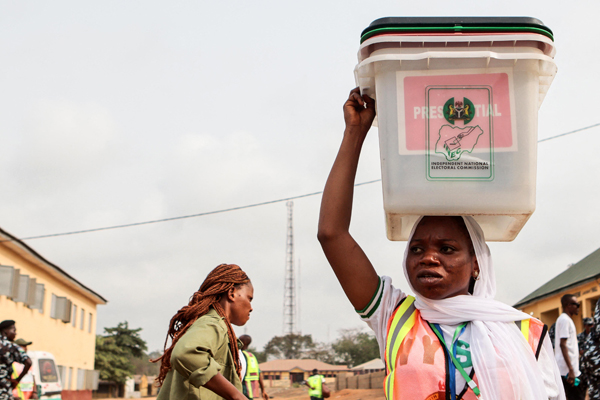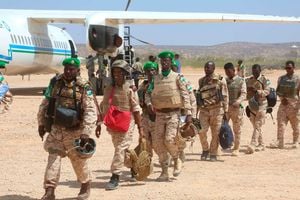Key dates in Nigeria's recent history

An Independent National Electoral Commission (INEC) official carries ballot boxes on her head to be set up at a polling station in Ibadan on February 25, 2023, during Nigeria's presidential and general election. PHOTO / AFP
What you need to know:
- Between 1967 and 1970, civil war rages in the southeast after Igbo separatists declare an independent Republic of Biafra.
- In 2009 an Islamist group known locally as Boko Haram launches a series of attacks in northeastern Nigeria.
As Nigeria prepares to vote for a new president on Saturday, AFP has compiled some key dates in the country's history since independence from Britain in 1960.
1966: First coup
The first in a series of military coups takes place in 1966 amid dissatisfaction with progress since independence and frustration that most people in top government roles are northern Hausa-speaking Muslims.
The main figures behind the coup are ethnic Igbo officers, from the mainly Christian south.
In a counter-coup the same year, Igbo officers are killed and a brutal slaughter of Igbo civilians occurs in the north, forcing thousands to flee to their southeastern heartland.
1967-1970: Biafra war
Between 1967 and 1970, civil war rages in the southeast after Igbo separatists declare an independent Republic of Biafra.
More than one million die, most of them Igbos, from the effects of war, famine and disease.
1993: Abacha dictatorship
Nigeria is mostly run by generals for the four decades after independence. One of the most brutal is General Sani Abacha, who rules from 1993 until his death in 1998, during which time he loots state coffers and has environmental activist Ken Saro-Wiwa hanged.
In 1999 the country returns to civilian rule under Olusegun Obasanjo.
2000: Sharia law in the north
By 2000, 12 states in the mainly Muslim north have reintroduced Islamic sharia law in parallel to the state and federal legal system.
Religious tensions mount, spilling over into riots and attacks that leave thousands dead.
2009: Enter Boko Haram
In 2009 an Islamist group known locally as Boko Haram launches a series of attacks in northeastern Nigeria.
In 2016 Boko Haram splits into two rival groups.
The splinter group grows and becomes a branch of the Islamic State, taking on the name Islamic State West Africa Province (ISWAP).
2015: Democratic power transfer
Ex-coup leader Muhammadu Buhari beats Goodluck Jonathan in 2015 elections that mark the first democratic handover of power in Nigeria's history. Buhari pledges to defeat Boko Haram and fight corruption.
He wins re-election in 2019 but under the constitution can only serve two terms.
2020: Protests against police violence
In October 2020, brutality by the SARS police unit triggers protests that snowball into the largest mass demonstrations in Nigeria's modern history.
They come to a halt after October 20, 2020, when security forces shoot at thousands of peaceful protesters gathered at the Lekki tollgate in Lagos, killing at least 11 people.
2022: Severe floods
In 2022, Nigeria suffers its worst flooding in a decade, which kills more than 600 during the rainy season and affects nearly three million people across the country.





